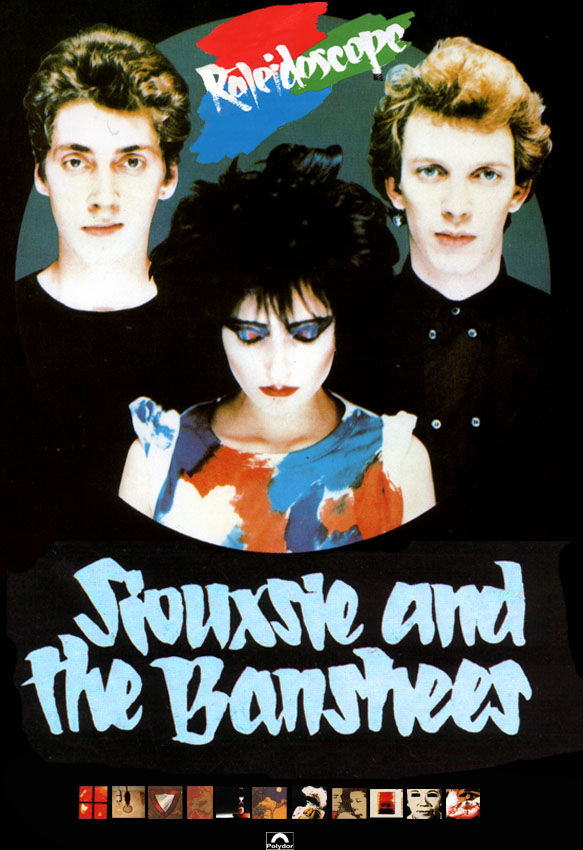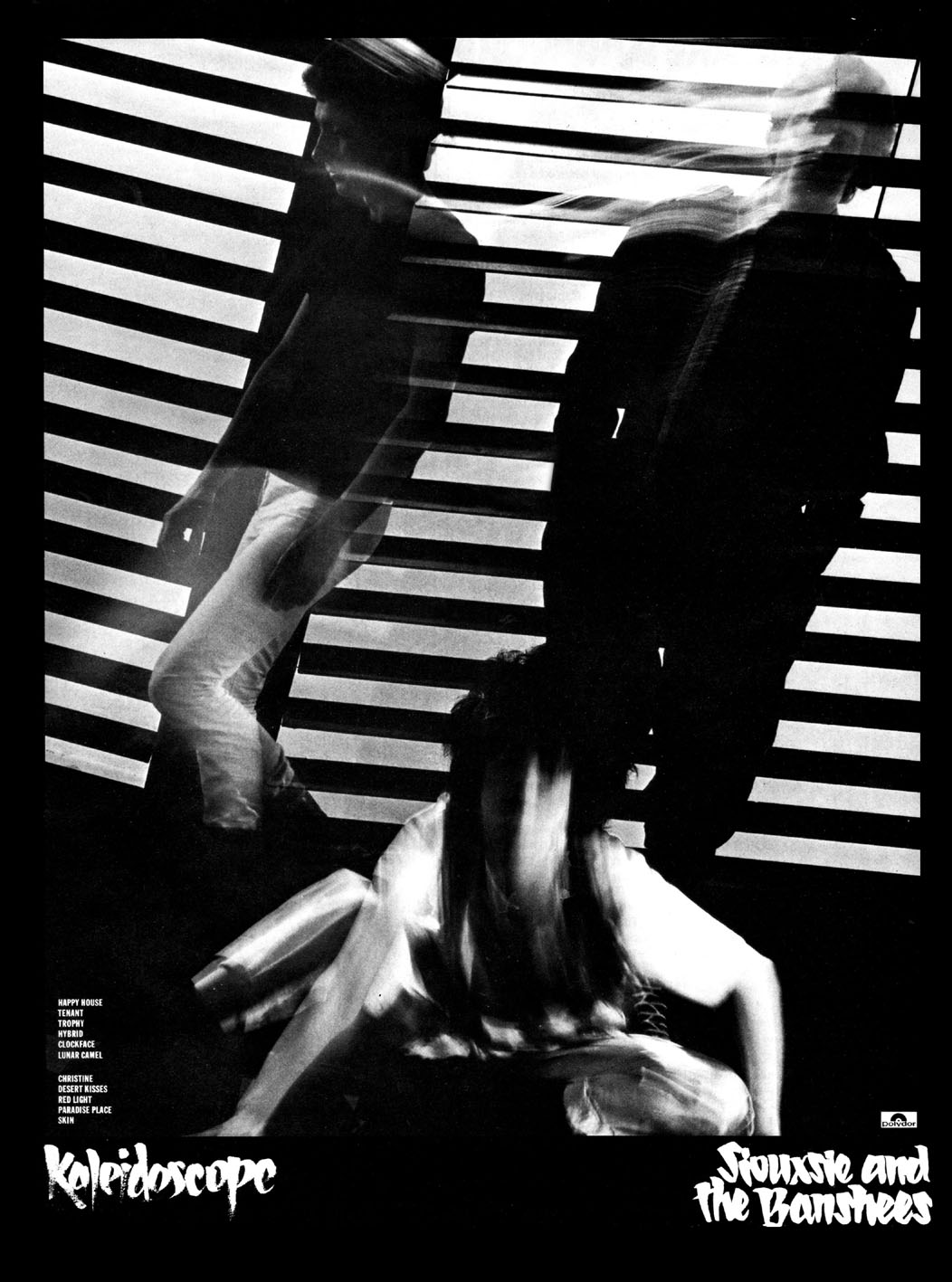|
|
 Though the words are as
usual garbled and low-lying, I could have sworn Siouxsie on this
album's "Hybrid" sang "I'm a horrid pain" and,
as a hard-boiled non-convert to the Banshees' cause of angst and
grind, the temptation was too much, I had to chuckle at the thought of
that accurate self-confession. Other than that, however, I've thrown
out the door memories of past Siouxsie horrors and approached
"Kaleidoscope" with a new, clean slate, duly hoping
that I'd have good reason to change my mind. Though the words are as
usual garbled and low-lying, I could have sworn Siouxsie on this
album's "Hybrid" sang "I'm a horrid pain" and,
as a hard-boiled non-convert to the Banshees' cause of angst and
grind, the temptation was too much, I had to chuckle at the thought of
that accurate self-confession. Other than that, however, I've thrown
out the door memories of past Siouxsie horrors and approached
"Kaleidoscope" with a new, clean slate, duly hoping
that I'd have good reason to change my mind.
The truth is, I haven't
found anything that suggests I should radically alter my opinion. That
in itself is not saying that the Banshees' sound hasn't altered: it
has, and more so than perhaps the singles "Happy House" and
"Christine" would have you believe. In fact, those two songs
open each side and, as unmistakably the two best tracks, overshadow
the remainder of the album and reveal it glaringly for what it is,
namely an unsatisfactory hollow texture similar to but several pegs in
quality below both the singles.
In effect, it's this
overall patchiness that at first attracted me to
"Kaleidoscope" and made me warm to it as maybe a friendlier,
more relaxed and more appealingly less slickly-rounded record than any
of the Banshees' two previous albums. I drew in my mind comparisons
with The Buzzcocks' "A Different Kind Of Tension", also
their third album and, moreover, from the similar context of
successful punk hit singles band forcing themselves to progress and
open out a little, to break free from the very need to be successful
product with all but perfect vinyl scores each time.
Up until the end of the
first side Kaleidoscope's mistakes, its loose and overtly undynamic
sparsity, led me to think that I'd be playing it a lot as the most human
Siouxsie record to date. But the second side came,
"Christine" outshone everything on it for miles, the low-key
unforced fragility of the previous side now turned into a decidedly
weak drone that spelt a disappointing album. And so I snapped off a
star rating and "Kaleidoscope" slid down the scales from
being "transient" and "imperfectly insidious" to
being plain dull.
What went wrong? Well,
the music doesn't sound shiny and ego-centred as it did before and
however basic and unadventurous it may seem as criticism, the problems
stem from the gap left by Morris and McKay. There is an almighty gap
left, which Siouxsie's voice backed by Severin and a shakily
impermanent lead-guitar spot (filled alternately by John McGeoch or,
incongruously, Steve Jones or Severin or Siouxsie twiddling with
synths) can't fill. The soul and guts of the Banshees has apparently
been gorged away and what you're left with, Siouxsie's little ole
heart, isn't enough simply because of the coldness and the covertness
of that heart. Which leaves.... a hollow chamber of sound that's
pieced-up into eleven ostentatiously short-sharp tracks that never
quite begin to take off the ground before they're killed and the next
song begins.
Most hollow and
uninspired of all is the centre, the missing lead-guitar link. McGeoch,
a talented individual, slithers around on "Tenant" and his
own "Trophy" but he sounds a dicey, unsure Number Eleven
batsman who either lacks the confidence or doesn't yet grasp the
entirety of the music to try anything more substantial or striking.
Steve Jones, on the
other hand, is an unfortunately not totally but nearly inaudible mess
on "Clockface" and "Paradise Place"; the big
lad's out of his depth. Meanwhile, Siouxsie's debut synth venture,
"Lunar Camel", is play-it-by-numbers dullsville and the
spaces left highlight the weakness of Siouxsie's lyrics which here
stretch to the incredibly crass, "Fly me to the moon, get me
there soon...."
"Kaleidoscope"
is the work of half a band, you can almost spot the cracks that more
sympathetic foils to Siouxsie and Severin would have filled and made
more vigorous and altogether more satisfying. The music does have
intent behind it, perhaps too much of it: what it aims for is,
apparently, a much subtler Banshees' sound, more spacey, more
insidious, less scorchingly steam-driven and left open to the benefit
of a second or third careful listen. And it does work on the singles
(if a little too contrivedly on "Happy House", surely the
most unlovable catchy hit of the year). On the rest of Kaleidoscope's
short bursts of music, however, it's an only very minimally effective
ploy which isn't at all helped by the sterile, pristine production
which is too ordinary and orderly a coating for so ordinary a set of
songs.
For all the shambolic
impermanence of the band, there's no edge here, no rough glints of
feeling, nothing that draws you inwards. Too frequently Siouxsie
appears to be writing songs for the sole purpose of making a display
of writing songs. The closing "Skin" is, so we're informed,
"a comment on the yearly seal-cull", something she should
leave to Jim Capaldi or David Attenborough. "Clock Face" by
the way, lumbering great S. Jones and all, bears a frightening
resemblance to, of all things, The Undertones' "Hard Luck",
enough of a comment in itself about the Banshees' current crazy
directionlessness.
"Kaleidoscope" is easily the craftiest album title of the
year! It hints, of course, at a broadening out in the music, a new
opening, a change for width. The hard truth is, with the Morris-McKay
departure as a tempting cause/effect element, the music of Siouxsie
and the Banshees is walking a precarious line between dreams of gently
adventurous progression and, what seems far more probable, a chronic
dearth of ideas and a resultant sheer sluggish lack of inspiration.
And that's too fine a line for even the coldest of cold-wave
comfort."
2 Out Of 5
Dave McCullough
|
|
 And
from the ashes, bye bye blackheads, hello Budgie. From the splinters
came Kaleidoscope. Obvious to all that new ways of writing and working
had immerged through the necessity of the 79 split. And thank god for
Budgie, Morris was always so heavy, so plod, plod, thud, thud. The
introduction of Budgie's intricate drum sounds and the use of acoustic
guitar & synths before the synth explosion was genius. A lighter
touch, veering away from the verse, chorus, verse structure. Not so much
a concept as its predecessors, but still the Banshees highest UK album
chart placing at No. 5 in 1980.
And
from the ashes, bye bye blackheads, hello Budgie. From the splinters
came Kaleidoscope. Obvious to all that new ways of writing and working
had immerged through the necessity of the 79 split. And thank god for
Budgie, Morris was always so heavy, so plod, plod, thud, thud. The
introduction of Budgie's intricate drum sounds and the use of acoustic
guitar & synths before the synth explosion was genius. A lighter
touch, veering away from the verse, chorus, verse structure. Not so much
a concept as its predecessors, but still the Banshees highest UK album
chart placing at No. 5 in 1980. 